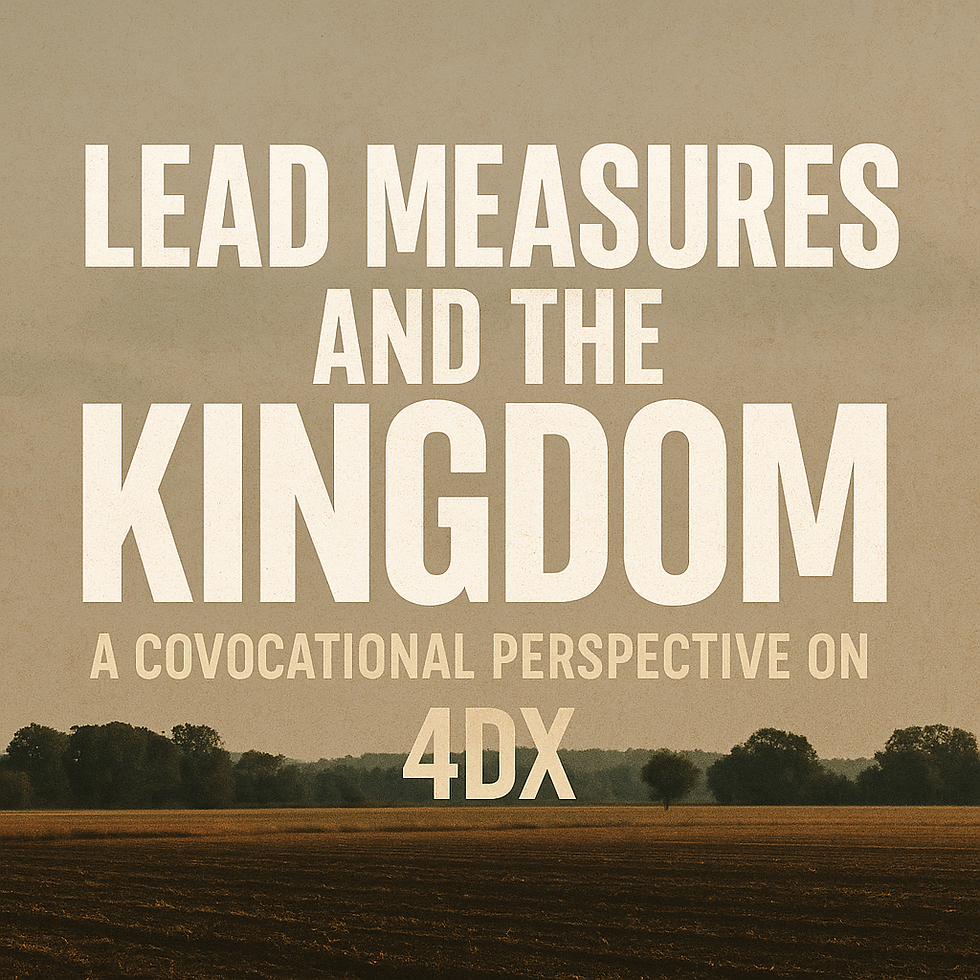Lead Measures and the Kingdom: A CoVocational Perspective on 4DX
- Dave Miller

- Oct 17, 2025
- 4 min read
by Dave Miller

Every leader measures something. We track growth, output, and results, but Kingdom-minded leaders must measure differently. The 4 Disciplines of Execution (4DX) highlights two types of measures: lead and lag. For those living a covocational calling, where faith and work merge under the reign of Christ, lead measures carry more weight. They define the faithfulness that precedes fruitfulness.
In the Kingdom of God, responsibility precedes results. The way we lead, work, and build reflects not only what we value but what we believe about God Himself. Faithfulness to the right process—rooted in biblical fidelity—positions us to receive fruit as a gift of grace, not as a product of control.
The Parable of the Talents: Responsibility as Worship
Jesus’ parable of the talents (Matthew 25:14–30) anchors this truth in vivid imagery. A master entrusts his servants with resources, expecting faithful action, not passive waiting. Two servants invest and multiply their trust; one buries it out of fear. The difference lies not in what they received but in how they responded.
This story reframes the heart of leadership and stewardship. Lead measures represent the faithful actions we take with what God entrusts to us—our time, influence, and work. Lag measures reveal the fruit that only God can bring through His grace. When we act in faith, He multiplies our obedience beyond anything we could orchestrate.
The servant who hid his talent misunderstood both grace and responsibility. Fear turned stewardship into paralysis. But the faithful servants understood the master’s intent and acted. Their initiative demonstrated trust. In the same way, Kingdom leaders step forward, not to control outcomes, but to participate in the ongoing grace of God. Lead measures express that faith. They turn belief into motion, stewardship into worship, and obedience into partnership with God’s purposes.
The Example of Jesus: Faithful Obedience Without Self-Glory
Jesus models this pattern perfectly. In the Gospel of John, He declares that He does nothing on His own but only what the Father shows Him (John 5:19). His daily lead measures—prayer, obedience, and alignment with the Father’s will—produced lag measures of healing, salvation, and resurrection power.
Jesus never glorified Himself. He trusted the Father to reveal glory in the right time and way (John 8:54; 17:1). His life demonstrates that Kingdom leadership flows from faith, not ambition. He teaches us to act out of obedience, not for recognition. Our faithfulness invites God’s fruitfulness. Our responsibility rests in the process; the results rest in His hands.
Creation Ontology: Doing the Right Things the Right Way
The way we do business, or whatever work we engage in, matters. Doing the right things, for the right reasons, at the right time, with the right measures, reflects the nature of the Kingdom. This way of working reaches back to creation itself.
When God formed the world, He established order, rhythm, and purpose. To work faithfully within that order means aligning our actions with His design. By stepping into the stream of creation’s reality, as Scripture reveals, we participate in what is good, right, and true. Lead measures flow from that ontology—they shape our values and direct our actions toward what reflects God’s original intent. Doing what is right, rooted in biblical fidelity, always produces the kind of results that bring glory to the Creator.
Responsibility and Opportunity: The Language of Stewardship
When results fail to align with our expectations, we return to the heart of stewardship. Lead measures define my responsibility—what God has entrusted to me right now. Lag measures define my opportunity—the outcomes that God brings through grace.
As those outcomes unfold, they become new responsibilities to steward. This cycle captures the Kingdom dynamic of grace and growth. Faithful action leads to God-given opportunity, which then invites deeper faithfulness. Lead measures call us to walk in obedience, knowing grace fills every gap between what we can do and what only God can do.
Lead measures are about Kingdom process: doing things the Kingdom way, with biblical fidelity, aiming toward the calling God has revealed. Grace carries us forward, and gratitude keeps our hearts right. As we thank God for what He brings, we embrace each new opportunity as another responsibility, moving forward in rhythm with His will.
Reframing the Whole
When we view leadership through this lens, success no longer depends on control but on cooperation with the Creator. We measure faithfulness first because it mirrors God’s nature. We prioritize the right actions because they reveal His wisdom and design. Lead measures shape not only what we do but who we become.
This reframing transforms the language of work, business, and ministry. The faithful steward does not chase outcomes; he cultivates them through obedience. The covocational leader does not divide sacred from secular but unites both under Christ’s rule. In every sphere, responsibility precedes opportunity, and obedience precedes fruitfulness.
The Practice of Kingdom Leadership
When outcomes align, we celebrate with gratitude. When they do not, we refine our faithfulness. The question never changes: Have I stewarded what the Father placed in my hands?
Lead measures keep us anchored in obedience while grace bridges the gap between human effort and divine outcome. In the Kingdom, ambition bows to trust. We pursue the right actions, for the right reasons, in the right way, and we leave the increase to God.
Kingdom leadership begins with stewardship and ends in His glory. Faithful lead measures today become tomorrow’s opportunities for greater trust, greater responsibility, and deeper joy in the work of the King.




Comments